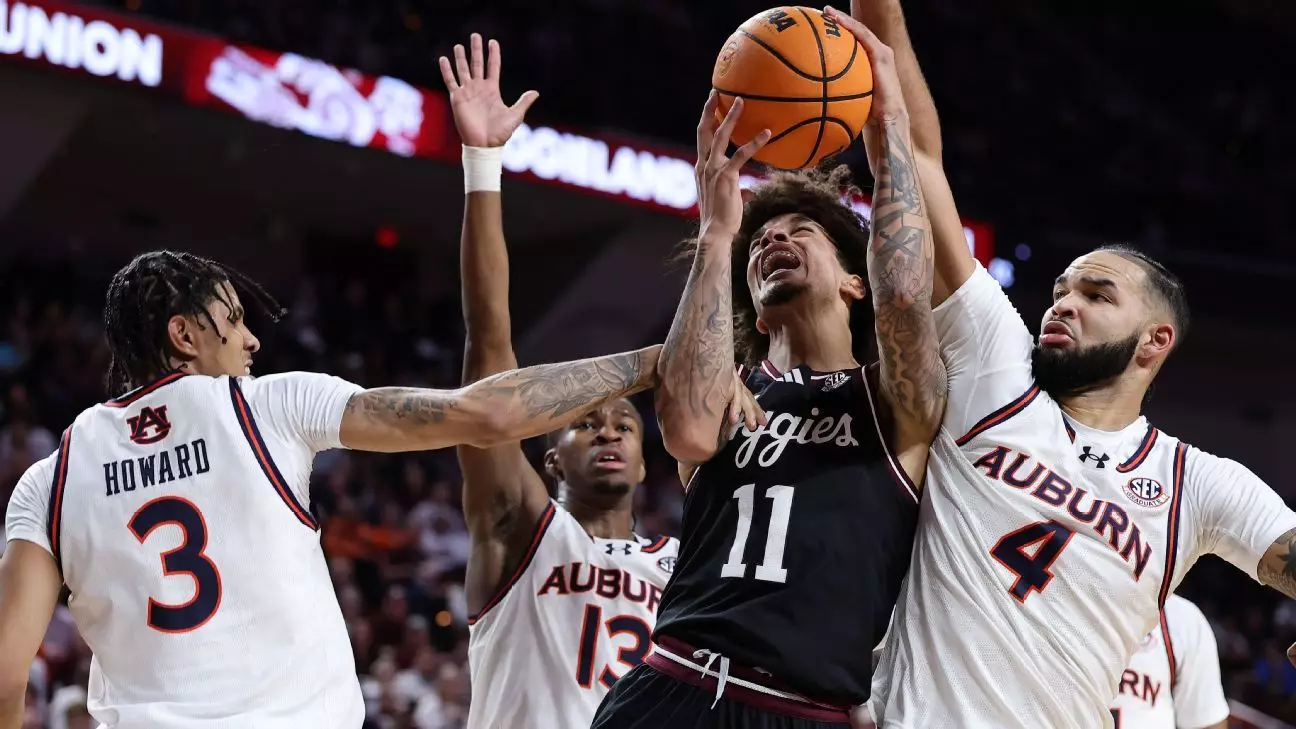In a shocking turn of events, the Auburn Tigers, previously perched atop the college basketball rankings, found themselves unceremoniously dethroned by the Texas A&M Aggies. The game’s outcome, an 83-72 victory for the Aggies, has sparked a flurry of reflection on what it means to truly dominate a game. Bruce Pearl, Auburn’s head coach, aptly summarized the defeat by stating, “They just physically dominated us.” This statement alone encapsulates the potency of physicality in basketball—a quality that is often overlooked in favor of flashy offense or three-point shooting.
Texas A&M showcased remarkable physical prowess throughout the game. This victory not only marked a pivotal moment for the Aggies, as it was their first win over a No. 1 ranked team, but it also ended a season-long four-game losing streak. The triumph reveals an essential truth about competitive sports: no matter how skilled a team may be, they can be outworked and out-muscled.
Auburn’s Reluctance to Acknowledge Their Shortcomings
Despite acknowledging the Aggies’ performance, Pearl’s comments seemed to sidestep one critical aspect—the tendency of top teams to underestimate opponents when they have already achieved significant milestones, such as clinching a conference title. While Pearl was quick to deflect blame onto A&M’s physicality, one can’t help but wonder if his players may have exhibited a certain complacency. Adopting a mentality of invincibility can often be a double-edged sword, leading to susceptibility to upsets like this one.
Furthermore, Auburn’s lack of adaptability in the face of Texas A&M’s strategy raises questions about their readiness to confront challenging matchups in the postseason. The fact that the Aggies dominated the boards to the tune of 24 offensive rebounds should have set alarm bells ringing for the Tigers. Instead, Auburn appeared caught off guard, showcasing a worrisome lack of self-awareness in evaluating not only their game plan but also their execution.
The Weight of Individual Performance on Team Success
In addition to worrying tactical oversights, Auburn’s struggles can be traced to individual performances—notably, star player Johni Broome’s underwhelming continued slump. Scoring only eight points, Broome carried the burden of a lingering shoulder injury, which may explain his reduced efficiency. When a team is built around a standout player, their struggles can ripple through the entire lineup, revealing the importance of maintaining peak physical condition.
Moreover, the absence of Denver Jones, one of Auburn’s top defenders, only exacerbated their challenges on the court. The inability to field a full-strength roster will always be a hurdle for elite teams, and Pearl’s comments about missing key players indicate a failure to anticipate how these nuances can significantly impact the team’s performance.
Buzz Williams and the Resilient Spirit of Texas A&M
On the flip side, we have Buzz Williams and the Texas A&M Aggies, who exemplified superior coaching and preparedness. Williams emphasized two crucial attributes: physicality and communication. These simple yet profound pillars are often cast aside in the flashy world of college basketball, where style frequently overshadows substance. By instilling these values, Williams propagated a mindset that allowed his team to not only seize the moment but to also harness the emotional energy of Senior Night—a night laden with significance and pride for the team’s history.
Wade Taylor IV’s remarks about building the program from the ground up remind us of the importance of dedication and resilience in sports. When a team plays not just for victory but for their legacy and the players who came before them, the results can be electrifying. The palpable emotion that accompanied Texas A&M’s victory over Auburn illustrates how a cohesive unit, fueled by purpose, can outperform a seemingly more talented squad.
What Lies Ahead for Auburn and the College Basketball Landscape
So where does this leave Auburn? The silver lining in their defeat is the opportunity for recalibration. As they prepare for the postseason, crucial lessons must be learned about resilience, physicality, and the dangers of overconfidence. This upset serves as a stark reminder that in a sport as unpredictable as college basketball, even the strongest teams can falter if they neglect the foundation upon which they were built.
As we witness the rise of teams like Texas A&M, the college basketball landscape is evolving. It’s no longer merely about talent and rankings but about grit, determination, and the willingness to battle in the trenches. If Auburn wants to reclaim their status, they will need to reevaluate and adapt. Only through embracing their vulnerabilities can they hope to rise again and truly cement their claim at the pinnacle of college basketball.

